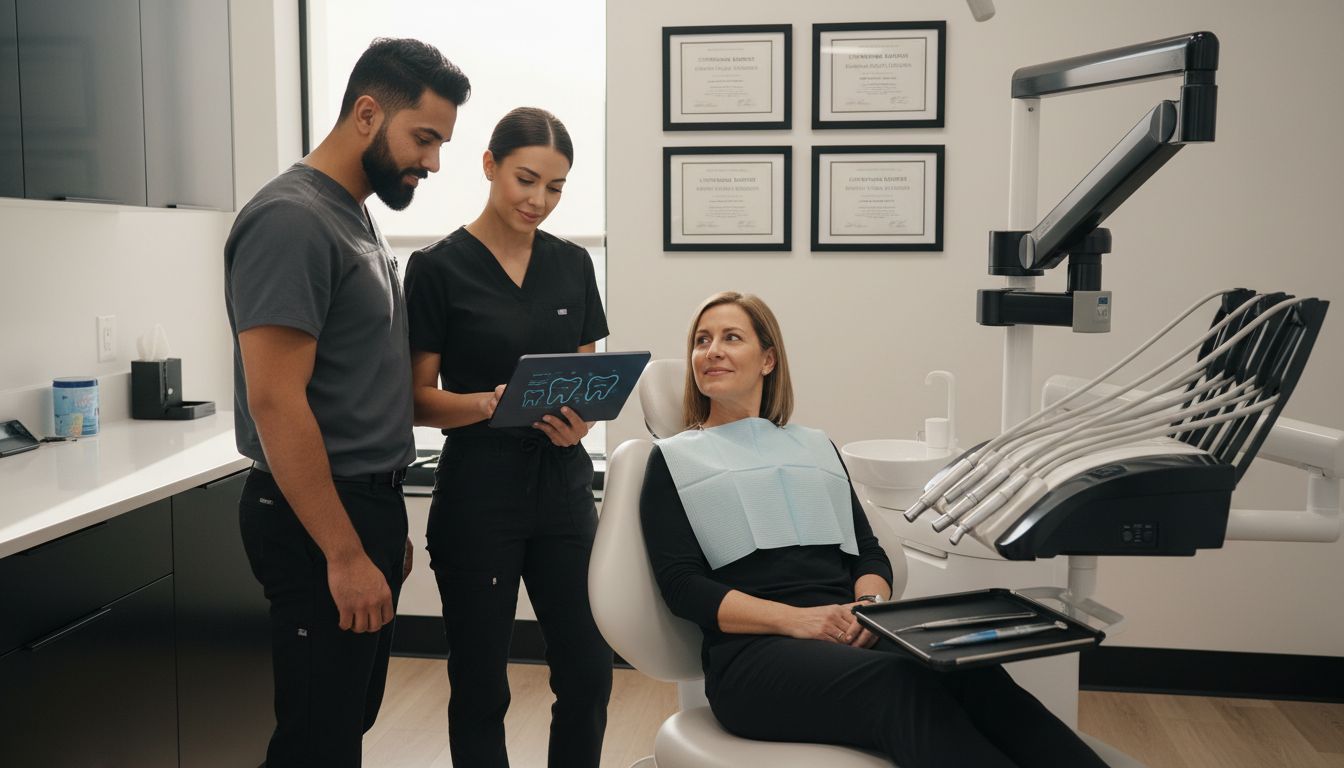Nearly every american dentist faces the reality that staying current is not just a goal but a requirement in the field. With over 90 percent of dental professionals participating in continuing education, the expectation to keep up with changing technology, updated treatment options, and evolving patient needs is stronger than ever. Understanding what continuing education really means can help build confidence and ensure that each dental practice stands out by delivering expert care grounded in the latest advances.
Table of Contents
- Defining Continuing Education In Dentistry
- Types Of Dental Continuing Education Programs
- Mandatory Requirements And Licensing Impacts
- How Continuing Education Improves Patient Care
- Challenges And Common Pitfalls For Dentists
Key Takeaways
| Point | Details |
|---|---|
| Importance of Continuing Education | Continuing education is essential for dental professionals to maintain professional competence and high-quality patient care. |
| Diverse Education Programs | Various continuing education programs are available, covering clinical techniques, practice management, and advanced technologies. |
| Mandatory Licensing Requirements | Many states require continuing education for dental licensure, ensuring practitioners stay informed of advancements in the field. |
| Impact on Patient Care | Continuous learning enhances patient care through improved techniques and technologies, ultimately leading to better patient outcomes. |
Defining Continuing Education in Dentistry
Continuing education in dentistry represents a structured professional development pathway designed to keep dental professionals current with the latest scientific knowledge, clinical techniques, and ethical standards. Dental continuing education is not just a recommended practice but a critical component of maintaining professional competence and delivering high-quality patient care.
According to the American Dental Association, continuing dental education consists of targeted educational activities that accomplish several key objectives:
- Review existing dental concepts and techniques
- Convey advanced information beyond basic dental training
- Update knowledge on scientific and clinical advances
- Incorporate evidence-based dentistry principles
- Enhance professional ethics and standards
The FDI World Dental Federation emphasizes that continuing education applies to both general dentists and dental specialists. Its fundamental purpose is to help professionals maintain, improve, and broaden their knowledge throughout their careers. This ongoing learning process ensures dentists can adapt to emerging technologies, evolving treatment methodologies, and increasingly sophisticated patient expectations.
Professional development through continuing education is not merely about accumulating credits or meeting regulatory requirements. It represents a commitment to excellence, patient safety, and the continuous improvement of dental healthcare delivery. By staying informed about the latest research, techniques, and technological innovations, dental professionals can provide more precise, effective, and compassionate care to their patients.
Types of Dental Continuing Education Programs
Dental professionals have access to a diverse range of continuing education programs designed to enhance their knowledge, skills, and professional capabilities. Continuing education programs cover multiple domains, ensuring dentists can stay current with evolving industry standards, technological advancements, and best practices.
According to the Health Sciences Center, continuing dental education encompasses several critical program types:
- Practice Management Programs: Focus on administrative and operational skills
- Educational Methodology Courses: Targeted at academic dental teaching professionals
- Coding and Reimbursement Training: Helps dental offices optimize financial processes
- Research Advancement Workshops: Explores latest developments in basic and clinical sciences
The American Dental Education Association further expands the landscape of continuing education by offering innovative learning formats such as:
- Online resources like ADEA eLearn
- Interactive seminars and workshops
- Leadership development programs
- Research-focused educational platforms
These programs are strategically designed to address different learning needs and professional growth stages. Whether a dentist seeks to refine clinical techniques, understand emerging technologies, or improve practice management skills, continuing education provides targeted pathways for professional development. Some programs offer hands-on training, while others leverage digital platforms to deliver flexible, accessible learning experiences that fit busy professional schedules.
By participating in these diverse continuing education programs, dental professionals can maintain their competitive edge, ensure patient safety, and demonstrate a commitment to lifelong learning.
 Learn more about our dental membership plans that can help support your ongoing professional development journey.
Learn more about our dental membership plans that can help support your ongoing professional development journey.
Mandatory Requirements and Licensing Impacts
Continuing education is not merely a professional recommendation but a critical requirement for maintaining dental licensure across most states. Licensing requirements directly link professional certification to ongoing educational participation, ensuring that dental practitioners remain competent and current in their field.
According to research from the Zagazig University, mandatory continuing education plays a significant role in relicensure processes. This systematic approach requires dentists to participate in continuous professional education to maintain their professional licenses, fundamentally ensuring practitioners stay updated with the latest advancements and adhere to current professional standards.
Typical mandatory continuing education requirements often include:
- Minimum annual credit hours of professional training
- Specific coursework in emerging dental technologies
- Updates on medical ethics and patient safety protocols
- Documentation and verification of completed educational activities
- Compliance with state-specific professional development guidelines
The licensing impact extends beyond simple credit accumulation. These requirements serve multiple critical functions:
- Protecting patient safety by ensuring current medical knowledge
- Maintaining high professional standards across the dental industry
- Encouraging ongoing skill development and technological adaptation
- Providing structured pathways for professional growth
Professional dental boards typically enforce these requirements through rigorous review processes. Dentists must carefully track and document their continuing education credits, often submitting detailed records during license renewal periods. Failure to meet these mandatory educational standards can result in license suspension or significant professional penalties.
Learn more about our dental membership plans that can help support your ongoing professional development and licensing requirements.
How Continuing Education Improves Patient Care
Continuing education serves as a critical mechanism for transforming dental practice by directly enhancing the quality and effectiveness of patient care. Patient-centered care goes far beyond basic treatment, requiring dental professionals to continuously adapt and refine their approach to meet evolving healthcare standards and patient expectations.
According to research from the International Journal of Contemporary Medical and Public Health, continuing education enables practitioners to integrate emerging technologies and advanced clinical techniques that significantly improve patient outcomes. This includes adopting innovative approaches such as digital workflows, artificial intelligence-powered diagnostics, and minimally invasive procedures that make dental treatments more precise, efficient, and comfortable.
Key ways continuing education enhances patient care include:
- Introducing advanced diagnostic technologies
- Reducing treatment invasiveness
- Improving procedural accuracy
- Minimizing patient discomfort
- Accelerating recovery times
The FDI World Dental Federation emphasizes that career-long professional development strengthens practitioners’ commitment to public health. By staying current with evidence-based practices, dentists can provide more comprehensive, compassionate, and scientifically grounded care that addresses individual patient needs more effectively.
Ultimately, continuing education transforms patient experiences by equipping dental professionals with the knowledge, skills, and technological understanding necessary to deliver exceptional healthcare.
 The ongoing learning process ensures that patients receive treatments aligned with the most current scientific understanding and technological capabilities.
The ongoing learning process ensures that patients receive treatments aligned with the most current scientific understanding and technological capabilities.
Learn more about our dental membership plans that support continuous professional development and patient-centered care.
Challenges and Common Pitfalls for Dentists
Continuing education in dentistry is a complex journey fraught with unique challenges that can potentially derail professional development efforts. Professional adaptation requires dentists to navigate multiple obstacles while maintaining their clinical practice and personal commitments.
According to research from the Zagazig University, dentists frequently encounter significant barriers to continuing education, including:
- Limited access to quality educational programs
- Substantial financial constraints
- Difficulty balancing professional development with clinical responsibilities
- Lack of awareness about relicensure educational requirements
The challenges extend beyond logistical considerations. Time management becomes a critical skill as dental professionals attempt to integrate learning with their demanding professional schedules. Many practitioners struggle to find educational opportunities that are both conveniently scheduled and directly applicable to their specific practice needs.
The FDI World Dental Federation emphasizes that dental professionals must continuously adapt to changing public needs and emerging medical knowledge. This requirement creates additional pressure to stay current while managing day-to-day clinical responsibilities.
Financial considerations represent another substantial challenge. Continuing education programs can be expensive, and many dental professionals must carefully budget for these essential professional development experiences. The investment of time and money must be strategically balanced against potential professional benefits and licensing requirements.
Understand the root of dental anxiety to help navigate the complex emotional landscape of professional development and patient care.
Enhance Your Dental Career and Patient Care with Ongoing Learning
Continuing education in dentistry plays a vital role in helping professionals stay current with advanced techniques, evolving technologies, and patient-centered care. The challenges of balancing licensure requirements, time constraints, and financial investments can feel overwhelming. Yet prioritizing these educational opportunities means you can improve treatment precision, patient comfort, and overall practice excellence.
If you are looking for a supportive environment that values continuous growth alongside exceptional patient experiences, explore the personalized dental solutions offered at DentalAteliers.com. Our practice, led by Dr. Kunal Narang in Lynnwood, WA, embraces the latest dental advancements while fostering a welcoming atmosphere designed for comfort and trust.

Take the next step toward integrating high-quality patient care with professional development. Learn how our membership plans can help you sustain your continuing education goals. Request an appointment online today or discover more about our comprehensive services to support your lifelong commitment to dentistry at DentalAteliers.com.
Frequently Asked Questions
What is the purpose of continuing education in dentistry?
Continuing education in dentistry aims to keep dental professionals updated on the latest scientific research, clinical techniques, and ethical standards necessary for high-quality patient care.
What types of continuing education programs are available for dental professionals?
Dental professionals can participate in various continuing education programs, including practice management courses, educational methodology training, coding and reimbursement training, and research advancement workshops.
Are there mandatory continuing education requirements for dentists?
Yes, most states require dentists to complete mandatory continuing education to maintain their licenses, which includes a minimum number of professional training hours and specific coursework related to dental practice.
How does continuing education improve patient care in dentistry?
Continuing education enhances patient care by allowing dentists to integrate advanced diagnostic technologies, improve procedural accuracy, reduce treatment invasiveness, and stay updated with evidence-based practices, ensuring better patient outcomes.


.svg)